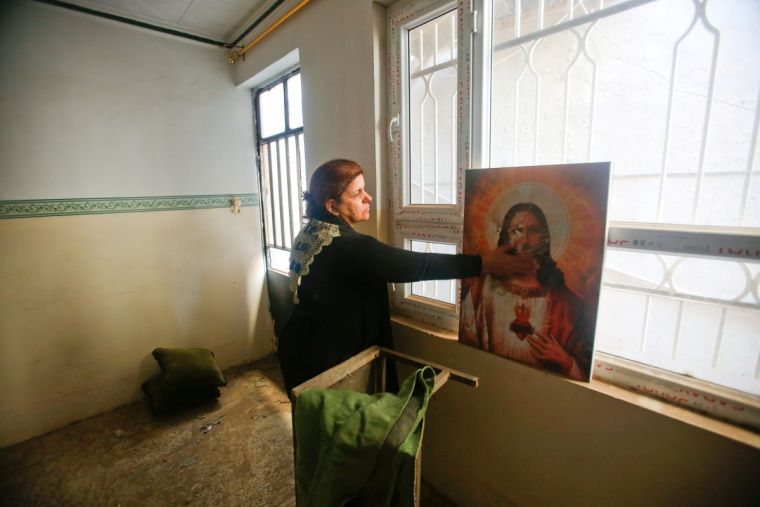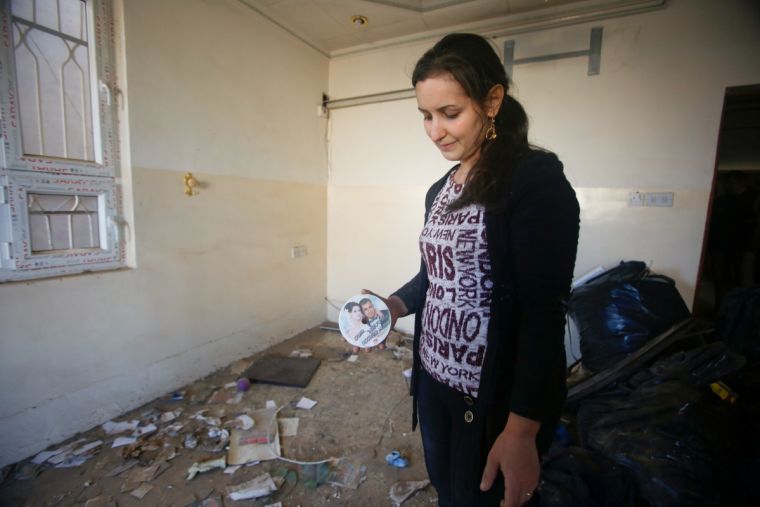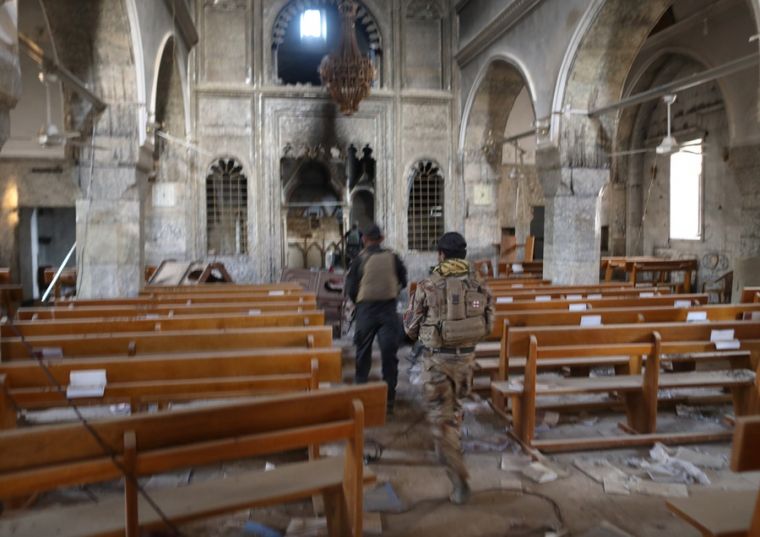Iraqi Christians Revisit Historic Town Abandoned By ISIS

Just weeks after their town was liberated from Islamic State, Iraqi Christians have begun to return to Bartella to see what is left of their homes and belongings.
Though ISIS has now been pushed out, devastation remains in the jihadis' wake.
For Said Shaba, who fled ISIS when they overran the town two and a half years ago, all that is left is a CD from his daughter's wedding and a picture of Jesus, desacrated by militants.
Jihadis stole a safe with his savings and set Shaba's two-storey house ablaze before Iraqi forces pushed them out a month ago from the northern town of Bartella as part of a campaign to retake nearby Mosul, the group's last stronghold in Iraq.
With the jihadists using suicide car bombers to stop an army advance on Mosul located just 12 miles away, Bartella remains a tense ghost town.
Black army Humvees patrol the potholed streets where Islamic State fighters set homes on fire, while rows of shops and restaurants have been flattened during fighting.
But tired of living with his seven-member family in a rented house in nearby Erbil, Shaba and other Christians came to check on their houses for the first time since fleeing Bartella in 2014 when Islamic State seized Mosul and much of Iraq's north.
"They destroyed and stole everything. They even took away our safe," the 59-year-old told Reuters, pointing to a wardrobe in his bedroom where a safe containing $1,400 in local currency and dollars once stood.
When rumors of an Islamic State offensive in August 2014 spread, Shaba drove his family to the safety of Erbil one morning, planning to return to take cash and documents. But he never made it back as the jihadists were already in control of Bartella by the afternoon.
His petrol storage facility, the family's main source of income, a few blocks from his modest house, was destroyed during fighting, he said.
Luckily, among the debris on the house's floor a picture of Jesus survived though militants tore out parts of the face. His wife Nidhal kissed the painting and put it on a wall in the ransacked reception room.
A CD containing pictures of their daughter's wedding also made it through the occupation.
"They have left nothing intact including windows, doors and walls," said Milano Yousuf, Shaba's daughter. "This CD is more important to me than all the furniture. It is irreplaceable."

The Mart Shmony Syriac Orthodox Church in Bartella has also been seriously damaged. Left charred by a fire, inside the church pews were overturned by militants, and hymn books and Bibles torn apart and thrown on the floor.
According to the Telegraph's Josie Ensor, graffiti scrawled on the walls of the church read: "Our God is higher than the cross".
Hussam Matteh, a member of the Nineveh Plains Forces – a Christian militia fighting ISIS – helped raise the cross on the roof of the church after liberation.
"We're feeling something you can't describe – that's how happy we are," he told the Financial Times. "We are now back home in the land of our ancestors, our churches and our heritage."
He added: "I want to tell my people: don't go. Stay. There is no reason to flee Iraq and go abroad. This our land, we have it – and from now on, we will be the ones who defend it."

But returning for good to Bartella and other nearby towns is not an option for now for thousands of civilians – Christians and Muslims alike – as the battle for Mosul drags on.
The army has closed Bartella and other towns and villages, using them as forward base. Special forces commanders and US officers, who have been backing the army campaign, met in the town on Wednesday.
The Iraqis and the Americans arriving in Humvees declined to discuss the meeting, which took place amid heightened security. Dozens of army vehicles with mounted guns were parked on an unpaved square in the town.
The army only lets in civilians selectively to inspect their houses and take some belongings, officers say. Still, many hope they can stay.
Hundreds were queuing at a checkpoint, where officers sent many back for lack of paperwork. Shaba, the Christian entrepreneur, said he got his army permit to go home only through "wasta", or personal connections.
"We need to make sure the places are safe, that Daesh left no bombs," said an Iraqi officer, using a derogatory Arabic term for Islamic State.
Apart from Christians, there were also many Shi'ites, seen by Islamic State as heretics, trying to head home.
"We are trying to see our house for the first time since we fled in August 2014," said 28-year-old Ahmed Ali, a Shi'ite who escaped with his 17-member family from their Bartella home when the militants approached. His cousin was killed by the Sunni fighters, he said.
"Life has become very difficult, paying rents in Erbil with very little work," he said, standing with a veiled relative near the checkpoint where soldiers told civilians without permits go back. "We don't know whether our house still stands but we hope to go back soon, God willing."
Additional reporting by Reuters











